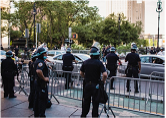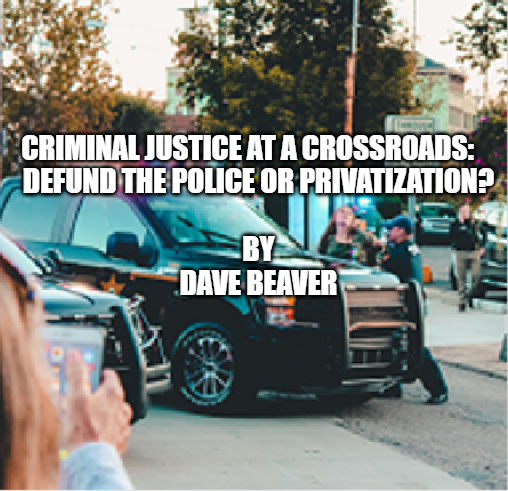Criminal Justice at a Crossroads: Defund The Police or Privatization?
For many years the United States has struggled with the dilemma of both efficiently and fairly providing for public safety. We have tried to do so through the failed government program we call the police department. Whether those failures are the result of innate flaws in our government system or evidence of our nation’s long history of state-sponsored racism seem to be a side-show debate the media circus has used to distract us from the truth. The communities targeted certainly seem disproportionate. They are the poor and the minority, both vulnerable populations without the means to fight back. They’re always a popular goat of our failed tyrannical system. But in the light of tragedies and injustices like that of George Floyd, the real question should be what the solutions are. How can we prevent tragedies like this from happening the future?
There is no doubt that our criminal justice system is in need of dire reforms, but is #defundthepolice the answer? Are there other reforms to be considered, and is any of it enough? Finally, what about the benefits of privatization? Can community-based and free market solutions fill the gap where public law enforcement has failed?
If one is too squeamish for full privatization, a great deal of research has been conducted on the benefits of a blended system, but it does show the potential improvements we could see from something more privatized.

First Thing’s First: Qualified Immunity
George Floyd is certainly not the first public figure to spark protests, popular political movements, and even violent riots across the country. The flaws with our criminal justice system have been evident since the days of Rodney King, and frankly even long before that. It hasn’t really stopped, but it’s hard to say whether it’s gotten worse or we’re just seeing it for the first time because of technology. So with the ability to publicly share such obvious and incriminating evidence, why does it require so much civil unrest and public outrage to ensure any justice in police brutality cases? Much of that can be largely placed on the shoulders of qualified immunity.
All the public safety reforms in the world will mean little as long as the officers who enforce them are immune to accountability on the job. Many “defund the police” efforts have called for safety “community groups” sometimes armed or sometimes not, trained in “de-escalation” and dispute mediation” techniques, but what authority do they have and how will they use it? Let’s not forget that George Zimmerman, killer of Trayvon Martin was not a cop, but such a “community group member”
Qualified immunity for those acting on “behalf of the law” is not only unjust. It is a danger to our communities, and if unaddressed the current “defund the police efforts” may simply lead to mob rule by a new evil taking place of the old.
Justin Amash’s Tri-Partisan bill would address this issue swiftly, but unfortunately will require immense support since Trump has made it clear he won’t support it.
Is America Ready to Disband the Police?
While hopes look high for the #defundthepolice efforts with the Minneapolis City Council approving unanimously, the results of this program remain to be seen. First, there are a few pitfalls this movement may not be considering. For instance, have they considered the fact that pension funding for police officers, is a large chunk of the budget and is virtually untouchable? Or what about the fact that in some cases a department may run as much as nearly 1/3 of its budget on collected fines on minor public violations? Unless they also decriminalize victimless offenses, officers may turn to more aggressive techniques that result in more police violence and harassment of citizens to cover the difference. They will also need to address the existence of victimless crimes to rid their communities of dangerous, black market elements that will still exist even if the the police aren’t confronting them.
Furthermore, is the general American public ready to support such a measure? Initial polling would seem to indicate otherwise with only 16% of the American public in support of “Defund the Police” efforts. On the other hand earlier surveys have shown 75% of Americans do support an overhaul of our evidently broken criminal justice system. Is there a logical compromise accompanied by sensible reforms that mainstream American can agree too?

Defunding Through Privatization
One of the stated goals of #defundthepolice is to transfer police funding to other “more beneficial” public initiatives, as well as to re-prioritize the efforts of police in focusing on serious and violent crimes. Police privatization may be the best way to do just that. We’ve already discussed some of the pitfalls above, and why these initiatives might not go as planned. But there’s more…
First let’s consider that employees working for private security companies on average make about 47% less than unionized public police officers. Let’s also consider that private police companies working with limited capital will be forced to manage their priorities. According to Police Chief Magazine, privatization may actually soon be coming to you. Why? Mostly because of budget constraints. At least one county saved over $1 million switching to a privatized system.
Not only are budgets becoming a problem but recruitment has also been down for years. This trend may not be the end of the world according to the Marshall Project whose research showed that violent crime at the same time has been down. Correlation is not causation, but this does show that numbers don’t tell the whole story. If departments are forced to do so, they may better manage their resources. ‘
Private companies exist to do just that.

What About Government Protections For Citizens? ‘
One of the most common fears surrounding privatization of the police is that it would lead to a rampant violation of citizens rights. The fear is that private security officers would not be subject to the same restrictions a publicly funded police force would. This can be true with security officers patrolling private property, for example, a mall security guard may search a suspected shoplifted without consent or probable cause. However, they cannot make an arrest.
Despite this pitfall, this would not be the case for a privatized municipal police force due to a groundbreaking civil rights case known as Marsh v. Alabama. The ruling indicated that officers performing duties of law enforcement in a community that was “open to the public” were subject to the same standards and regulations as public police officers. In other words if they were playing the function of law enforcement in a public space, they were just as bound as police officers to respect our constitutional rights. This and other case law would lead to the doctrine of “State Action” since the officers were seen as “State Actors” or acting on behalf of the government.
A Police Force that Serves the Community

One of the greatest benefits of a privatized police force essentially boils down to motivation. Private sector security companies are motivated by the mission of creating an environment of public safety and order for their clients. Law enforcement agencies are designed simply to enforce existing laws and statutes. Their funding is either guaranteed through taxation and they thus have no motivation to earn it, or it’s otherwise derived through the harassment of its citizenry.
Private companies and organizations will also not only be more likely to face public scrutiny and legal troubles if they perform poorly, but often their members are motivated by more philanthropic ventures. Consider the example of Dale Brown, the owner and founder of the Detroit Threat Management Center.
His organization began as he says with him “A rifle, and a dog” and his goal was to make his community safe in the face of frequent robberies and home invasion where he worked in his Detroit community. His low-cost body guard program has been provided for free to society’s most vulnerable members, including domestic violence victims. He is proud to say that in 20 years of his program none of his officers or clients have ever been injured on the job, and officers regularly use nonviolent and de-escalation approaches in lieu of deadly force.
His service has resulted in companies worth millions of dollars in crime-ridden neighborhoods going from red to black in the first time in years, as well as renewing and revitalizing Detroit communities the police had given up on.
Dale Brown has often said the key to his success has been motivation and putting the citizen first.
“The cornerstone for protection is love, not violence, not guns, not laws, but love. You cannot and will not truly protect anything that you don’t love.”
Whatever your opinions on law enforcement and criminal justice reform, it’s hard to argue with that. Perhaps men in the private sector like Dale Brown should be more often listened to.
Dave Beaver, June 19, 2020


